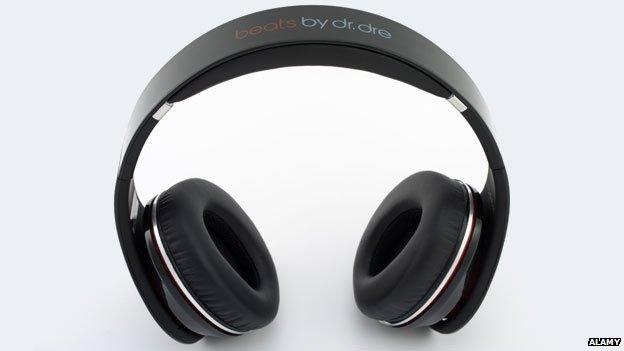Who, What, Why: What is the attraction of Beats headphones?
- Published

Apple is said to be in talks to buy headphone-maker Beats. What is the attraction of their £250 ($422) cans?
It would be a bold deal - Apple's biggest ever purchase. If media reports are correct, Apple is set to pay as much as $3.2bn (£1.9bn) next week to buy headphone and music streaming firm Beats.
Beats is best known for its big, brash, brightly coloured headphones. That lower case B - marked on each "can" - is worn with studied nonchalance by NBA basketball players, Premier League footballers and affluent young commuters. And sometimes even a middle aged spin doctor, external arriving at Downing Street.
They are lightweight and easy to wear. One of the company's founders - legendary hip hop producer Dr Dre - imbues them with automatic street cred. But the image comes at a price - a wireless pair is £250. The full collection on Beats' website ranges from £170 to £390. They have a bass-heavy sound popular with fans of RnB and hip hop.
"But the real audio cognoscenti wouldn't touch them with a barge pole," says technology blogger Tom Cheesewright. "Ultimately they're a fashion brand."
It can be hard for a technology company to become cool, he says. Beats' cunning idea is in taking a "fashion first" approach backed by music industry kudos, then adding technology.
Apple has always had a problem with sound quality, says Jonathan Margolis, technology expert for the Financial Times. And yet Beats is a surprising choice. "Beats is a brilliant marketing trick," he says. You can buy better quality sound for £100 less, he argues. To traditional Apple fans, "Bose and Harman Kardon would have been far less off-putting".
That could be deliberate, he concedes. Ride the New York subway and it seems nearly every black and Hispanic male is wearing Beats or imitations. Apple will reach a new demographic other than its white, hipster, arty, media crowd.
Then there's the streaming service, Beats Music. As an approving NPR blogger wrote, external, the system showed "that music is not a product, but a process grounded in the human impulse to connect". This service rather than a pair of street-savvy cans might be the real prize.
Follow @BBCNewsMagazine, external on Twitter and on Facebook, external